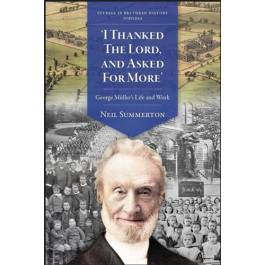
Müller is famous for his faith in God’s provision for orphans, but there was so much more to Müller than this. He pastored Bethesda Chapel in Bristol, sponsored home and foreign mission through his Scripture Knowledge Institution, supported schools in Bristol and throughout Britain and elsewhere, embarked on worldwide preaching tours, and decisively shaped the identity of the Brethren movement.
Neil Summerton objectively explains all these aspects of Müller’s life and work, aided by many freshly composed charts and tables.
'This monograph successfully combines scholarly appraisal with warm admiration.' Prof. David Bebbington
As reviewed by Stephen McQuoid, General Director of GLO, in March 2023: 'This is a significant work of scholarship which investigates the remarkable contribution of George Muller who was one of the most significant early Brethren leaders. Chapter 1 gives a potted history of Muller’s life while the subsequent chapters look at his spiritual life, his theological contribution, his evangelistic endeavours and mission contribution, his philanthropy and his contribution to education.
While coming from Germany he made his biggest contribution in Bristol, a city where he spent most of his life, working alongside other luminaries such as Henry Craik. Muller was an extraordinary man of faith and action and his sheer drive and desire meant that he achieved an astonishing amount. The extent of his ministry is sympathetically told by Summerton in what is clearly a labour of love by the author. Muller represents a bygone age the like of which we are unlikely to encounter again, but his story is an inspiring one and any reader prepared to work through the detailed historical evidence will not fail to be impressed by Muller who was a Christian statesman as well as a humble servant of God. For me the most intriguing chapter is chapter 5 on Living by Faith and Probity. This is partly because Muller’s faith was legendry as well as being practical and his self-sacrifice noteworthy. But also because Summerton points out, not only that Muller was careful to make ministry needs known, but also that the living by faith principle was not original to the early Brethren as some suppose. Indeed, it goes back at least to August Hermann Francke, the Pietist professor and founder of the Halle University (1694-1727). Clearly Muller’s Pietist roots greatly shaped him. This is an excellent piece of historical writing on the life of a remarkable man.'


